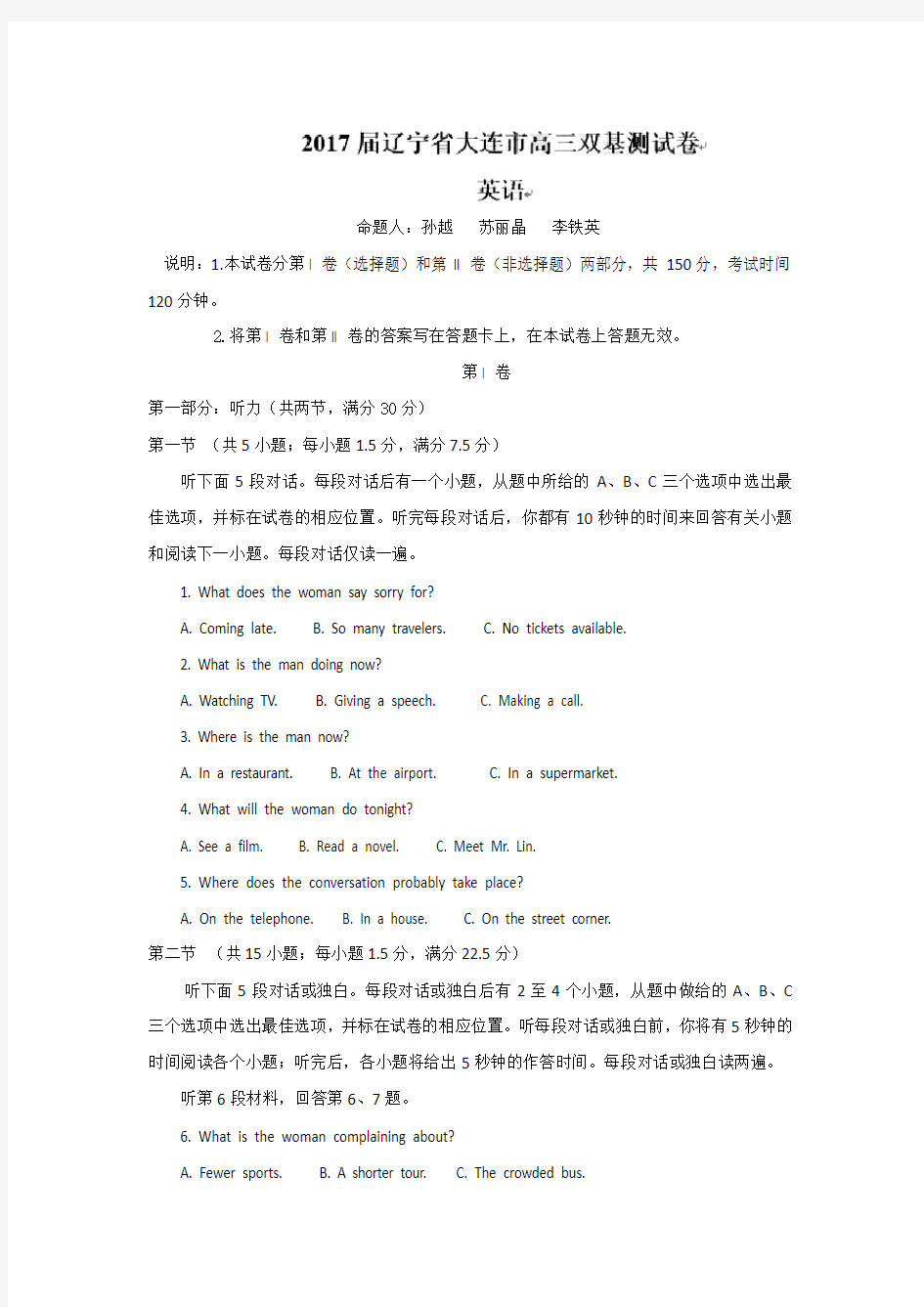
辽宁省大连市2017届高三3月双基测试英语试题 含答案 精品
- 格式:doc
- 大小:120.50 KB
- 文档页数:14


命题人:孙越苏丽晶李铁英
说明:1.本试卷分第I 卷(选择题)和第II 卷(非选择题)两部分,共150分,考试时间120分钟。
2.将第I 卷和第II 卷的答案写在答题卡上,在本试卷上答题无效。
第I 卷
第一部分:听力(共两节,满分30分)
第一节(共5小题;每小题1.5分,满分7.5分)
听下面5段对话。每段对话后有一个小题,从题中所给的A、B、C三个选项中选出最佳选项,并标在试卷的相应位置。听完每段对话后,你都有10秒钟的时间来回答有关小题和阅读下一小题。每段对话仅读一遍。
1. What does the woman say sorry for?
A. Coming late.
B. So many travelers.
C. No tickets available.
2. What is the man doing now?
A. Watching TV.
B. Giving a speech.
C. Making a call.
3. Where is the man now?
A. In a restaurant.
B. At the airport.
C. In a supermarket.
4. What will the woman do tonight?
A. See a film.
B. Read a novel.
C. Meet Mr. Lin.
5. Where does the conversation probably take place?
A. On the telephone.
B. In a house.
C. On the street corner.
第二节(共15小题;每小题1.5分,满分22.5分)
听下面5段对话或独白。每段对话或独白后有2至4个小题,从题中做给的A、B、C 三个选项中选出最佳选项,并标在试卷的相应位置。听每段对话或独白前,你将有5秒钟的时间阅读各个小题;听完后,各小题将给出5秒钟的作答时间。每段对话或独白读两遍。
听第6段材料,回答第6、7题。
6. What is the woman complaining about?
A. Fewer sports.
B. A shorter tour.
C. The crowded bus.
7. What will the man do?
A. Make up for loss.
B. Apologize to the woman.
C. Look into the master. 听第7段材料,回答第8、9题。
8. How much will the woman pay?
A. $50.
B. $55.
C. $40.
9. What will they NOT have at the party?
A. Alcohol.
B. Cold dishes.
C. Soft drinks.
听第8段材料,回答第10至12题。
10. Why does the man have a huge bill?
A. He pays for his roommate.
B. He often visits restaurants.
C. He spends money like water.
11. What does the roommate sometimes offer to do for the man?
A. Lend him money.
B. Pay the grocery bill.
C. Treat him to dinner.
12. What does the woman advise the man to do?
A. Speak up his thought.
B. Move out of the room.
C. Have meals alone.
听第9段材料,回答第13至16题。
13. What was yesterday’s call about?
A. A visit to a company.
B. A job interview.
C. A greeting.
14. What does the woman suggest wearing?
A. A sports dress.
B. A formal dress.
C. A causal dress.
15. What is the man’s bad habit?
A. Sleeping early.
B. Getting up late.
C. Arriving late.
16. What does the woman advise the man to do?
A. Tell lies.
B. Tell the truth.
C. Change bad habits.
听第10段材料,回答第17至20题。
17. What does Colin plant on the rooftop garden?
A. Flowers.
B. Vegetables.
C. Fruit.
18. Who believes urban agriculture can bridge nature and cities?
A. Henry.
B. Steven.
C. Peck.
19. Compared with California, what’s the weather like in Ottawa?
A. It’s warmer.
B. It’s colder.
C. It’s rainier.
20. Which is not the benefit of the roof gardens?
A. Reducing pollution.
B. Promoting business.
C. Attracting tourists.
第二部分阅读理解(共两节,满分40分)
第一节(共15小题;每小题2分,满分30分)
阅读下列短文,从每题所给的四个选项(A、B、C、D)中,选出最佳选项,并在答题卡上将该项涂黑。
A
We humans are superstitious, believing that Friday the 13th is bad luck and finding a penny is good luck. Here, then, are three of the most common superstitions.
Careful with that mirror
According to folktales, breaking a mirror is sure to bring yourself seven years of bad luck. The superstition seems to arise from the belief that mirrors don’t just reflect your image; they hold bits of your soul. That belief led old American Southerners to cover mirrors in a house when someone died, for fear that their soul might be trapped inside.
Like the number three, the number seven is often associated with luck. Seven years is a long time to be unlucky, so people have come up with solutions after breaking a mirror. These include touching a piece of the broken mirror to a tombstone or powdering the broken mirror.
Knock on wood
This phrase is designed to break away from bad luck: “Breaking that mirror didn’t bring me any trouble. Knock on wood.” The phrase may come from old tales about good spirits in trees or from an association with the Christian cross.
No umbrellas inside
…And not just because you’ll hurt someone’s eyes. Opening an umbrella indoors is supposed to bring bad luck. The origins of this belief vary from a story of an ancient woman who happened